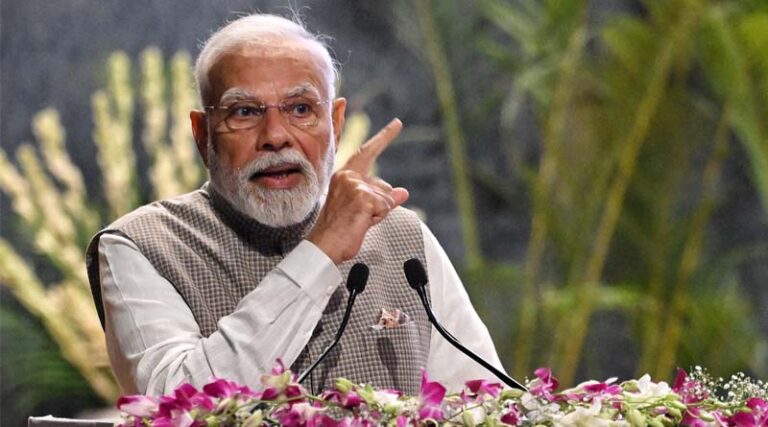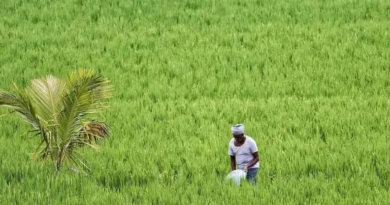
“India Will Never Compromise on Farmers’ Interests,” Declares Prime Minister Modi
07 August 2025, New Delhi: Prime Minister Narendra Modi delivered a powerful message of reassurance to India’s farming community and the global agriculture fraternity, declaring that “India will never compromise on the interests of its farmers, livestock rearers, and fisherfolk.” Speaking at the inauguration of the M.S. Swaminathan Centenary International Conference at ICAR-PUSA, New Delhi, he positioned farmer welfare as central to India’s developmental and agricultural policies.
The event marked a significant global gathering to honour the legacy of Prof. M.S. Swaminathan, widely regarded as the architect of India’s Green Revolution. The conference theme, “Evergreen Revolution: The Pathway to Biohappiness,”brought together international scientists, policymakers, and development professionals to explore sustainable agricultural practices, biodiversity conservation, and inclusive rural transformation.
A Legacy of Science for Public Good
Prime Minister Modi paid rich tribute to Prof. Swaminathan, highlighting his transformative role in achieving food self-sufficiency in India. “Dr. Swaminathan turned science into a tool for public good. He not only led India to food self-reliance but also laid the foundation for an Evergreen Revolution rooted in biodiversity, equity, and biohappiness,” said the Prime Minister.
Modi recalled his personal interactions with the late scientist, citing Swaminathan’s support for initiatives like the Soil Health Card Scheme during his tenure as Chief Minister of Gujarat. He lauded Swaminathan’s foresight in promoting salt- and drought-tolerant crops, millet research (now known as Shri Anna), community seed banks, and the concept of bio-villages.
Global Recognition for Food and Peace
One of the conference’s key highlights was the launch of the M.S. Swaminathan Award for Food and Peace, an international recognition jointly instituted by the M.S. Swaminathan Research Foundation (MSSRF) and The World Academy of Sciences (TWAS). This award honours individuals from developing countries who have made outstanding contributions to food security, climate justice, and equitable rural development.
The inaugural award was presented to Professor Adenle of Nigeria, acknowledged for his groundbreaking work in sustainable agriculture and innovation in fragile ecosystems.
India’s Agricultural Milestones
Prime Minister Modi emphasized that India’s agricultural journey continues to be a global example of resilience and innovation. He shared that India currently ranks first in the world in milk, pulses, and jute production, second in rice, wheat, cotton, fruits, and vegetables, second globally in fish production
In the previous agricultural year, India recorded its highest-ever foodgrain output, along with record production in oilseeds such as soybean, mustard, and groundnut.
“India Will Never Compromise on Farmers’ Interests”
Reaffirming his government’s commitment, PM Modi stressed that the welfare of farmers is the highest national priority. “Our policies are not merely assistance programs—they are designed to empower smallholders, reduce input costs, enhance income, and foster dignity in farming,” he said.
He emphasized that cooperatives and self-help groups (SHGs) are receiving increased financial support, giving fresh momentum to the rural economy.
Climate-Resilient Agriculture and Agri-Tech Innovation
The Prime Minister called for intensifying innovation to meet climate challenges, urging for the development of affordable soil testing tools, precision nutrient management systems, solar-powered micro-irrigation and drip systems, real-time AI and satellite data-based decision support platforms.
He asked if a nationwide digital system could be built to guide farmers on pest outbreaks, yield estimates, and optimal sowing periods, accessible even at the district level.
Referencing the Viksit Krishi Sankalp Abhiyan, launched in May–June 2025, PM Modi shared that over 2,200 teams of scientists worked across 700+ districts, reaching 1.25 crore farmers through 60,000+ grassroots programmes—an effort to bring agri-science from lab to land.
Inclusive and Equitable Rural Growth
In line with Prof. Swaminathan’s inclusive philosophy, the Prime Minister emphasized the need to empower women in agriculture, support tribal and coastal communities, and revive forgotten traditional crops for nutrition and resilience.
He reiterated that India’s development by 2047, as envisioned, will be realized only by ensuring that every section of society—especially farmers—actively contributes and benefits.
“Agriculture is not just about crops; it is about life, livelihoods, and dignity. We must integrate traditional wisdom with modern science, promote crop diversification, and ensure that farmers are at the heart of every agricultural decision,” Modi stated.
A Global Model of Sustainable Agriculture
The Prime Minister concluded by inviting global stakeholders to collaborate on building a food-secure future through equitable trade, sustainable innovation, and climate-resilient practices.
As India charts its course toward becoming a developed nation by 2047, the message was clear: its farmers will not be left behind—and their welfare will never be compromised.
Also Read: India’s FCV Tobacco Boosts Farmer Incomes, Exports More Than Double
📢 If You’re in Agriculture, Make Sure the Right People Hear Your Story.
From product launches to strategic announcements, Global Agriculture offers unmatched visibility across international agri-business markets. Connect with us at pr@global-agriculture.com to explore editorial and advertising opportunities that reach the right audience, worldwide.






